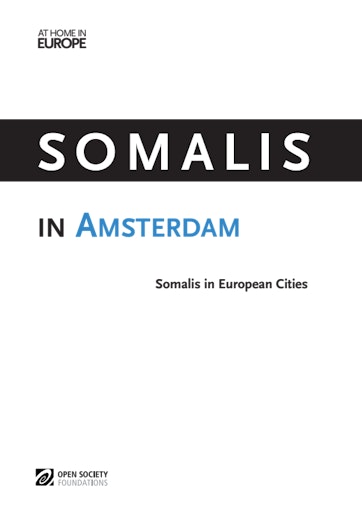Somali Refugees in Amsterdam: Struggle and Opportunity
By Ilse van Liempt & Gery Nijenhuis
Somalis began arriving in the Netherlands, mainly as refugees seeking asylum, after the fall of military dictator Siad Barre’s regime in 1991. A second period of immigration started around 2007 as a result of crisis in the south of Somalia and is still ongoing.
Today some 33,000 Somalis are officially registered in the Netherlands. In addition, the number of undocumented Somalis is estimated at between 1,300 and 5,900. The Somali population in the Netherlands is a very young one: around two-thirds are under 30, compared with around one-third in the Dutch population as a whole.
What are their daily lives like? What are their struggles and successes? The new report Somalis in Amsterdam examines the lives of a variety of people with Somali backgrounds in that capital city. It covers issues such as identity and belonging as well as their day-to-day interactions in areas like employment, health care, education, and political participation.
We interviewed 100 people, recent and new arrivals, young, old, and documented as well as undocumented. The study confirms previous findings that the socio-economic position of many Somalis in the Netherlands is weak in comparison to that of other immigrant and refugee groups. Their education levels in general are low, access to the labor market is limited, and dependence on welfare is high.
For newcomers the situation is even worse when they arrive in the Netherlands. Most have had no education at all, and they are often traumatized by war. Since January 2014, newcomers have been confronted with a new law on integration, which puts more emphasis on individual responsibility. For example, migrants need to find their own language courses, and there are no courses designed for people who cannot read. Many use digital learning techniques, which is in large contrast with the Somali oral culture.
While Somalis in Amsterdam value the civic integration course that focuses on language and employment skills, many do not succeed in reaching and maintaining good levels of proficiency in Dutch. As one 38-year-old female focus group participant said:
I just finalized my language course, but I am not sure whether it is sufficient to pass the exam, I find it so difficult to learn Dutch, I hardly see any progress. I also take conversation classes in Dutch, I pay for these myself, but since I never was in primary school, I find it difficult to catch up with Dutch language.
The lack of Dutch language fluency was perceived as one of the most significant barriers for Somali integration in the Netherlands. Many Somali parents cannot, for example, support their children in school and have problems understanding the Dutch school system. This creates conflicts. As one interviewee put it:
There are huge parenting problems in this community, and you will get clashes when the children go “Dutch,” in terms of language, but also in practices and culture. And everything remains behind closed doors; they want to solve problems themselves, but do not always succeed.
The fact that Somalis are a small group and that specific policies concerning minorities have been abolished makes it hard to lobby for solutions that target one ethnic group. The report acknowledges that policies should be general in their aims but also need to be equally effective for groups and individuals who face specific challenges.
One of the report’s recommendations is that the city of Amsterdam give more support to the Somali community, especially in terms of language. Moreover, Dutch institutions like schools and health institutions can make their services more accessible by bringing back the availability of interpreters, but also by creating more space for intercultural knowledge training.
Finally, participants in this study pointed out that Somalis themselves can take a more active role. As one 49-year-old male participant said:
If we want to influence policies then we should do something, we cannot always hide and say, “We are so few, so badly organized, with a nomadic life style.” Also, we cannot mention that it is their fault. We should start to organize ourselves, become members of a political party—Labour Party or Socialist Party, or Green Left—we should write letters, invite politicians, we cannot always remain passive.
The report recommends that Somali organizations in Amsterdam explore opportunities for collaboration with other institutions and make themselves more visible.
Somalis in Amsterdam is published by the At Home in Europe project of the Open Society Foundations.
Ilse van Liempt is an assistant professor in the Department of Urban Geography at Utrecht University.
Gery Nijenhuis is an assistant professor in the Department of Human Geography and Planning at Utrecht University.
